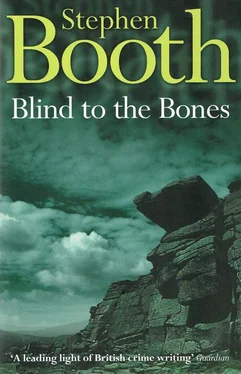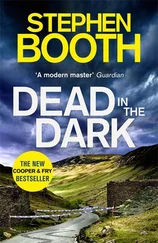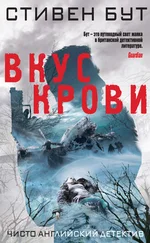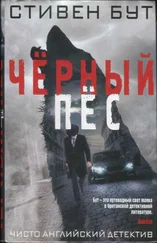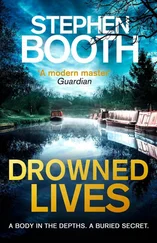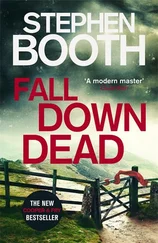Stephen Booth
Blind to the Bones
I’m grateful to John and Von Morley, and members of Black Pig, for their help during the writing of this book. Although the Border Rats are fictional, the Border tradition exists in many parts of Britain.
Friday
As soon as he opened the door, he could hear the screaming. It ripped through the damp air and shrieked in the yews. It echoed from the gravestones and died against the walls. It was like the sound of an animal, dying in pain. Yet this sound was human.
With every breath he took, Derek Alton seemed to draw the noise into his own lungs with the air, until something like an answering scream came from deep inside him. The asthmatic wheeze of his inflamed air passages was so high pitched that his ears couldn’t locate its direction, but identified it as a noise that came from the air around him. The pain in his upper chest told him where that noise came from.
And Alton knew where the screaming came from, too.
With shaking fingers, he brushed some of the dust from his sleeve. The exertion had made his collar stick to the back of his neck, and a few strands of hair had fallen over his forehead, where they lay like barbed wire on his skin. He rubbed at a fresh scratch on his knuckles, but managed only to smear a streak of blood across the back of his hand. He could taste dust in his mouth, too — old dust, the debris of years, stirred into the air by a random act of violence.
The screaming reminded Alton of the shriek of agony he had once heard from a rat, when a terrier had flushed it from its nest in a barn and its back had been broken under a farmer’s spade. The dying rat had squealed with its last strength, as its legs kicked and its pale claws clutched and uncoiled in the dry earth.
Now he waited, expecting to hear other noises. At first, there was only the stirring of the breeze in the yews and the drip of rainwater from the ivy on the church walls. But gradually he began to distinguish something else — a rhythmic thudding. It reverberated inside a room some distance away, well beyond the first houses on the road into Withens. It was like a ritual drumbeat, folding over on itself and creating multiple layers of sound. He shivered as he recognized the undertones of menace, which spoke of imminent death.
Then there was a burst of laughter somewhere in the village, followed by the slam of a door. A female voice shouted something that Alton couldn’t make out. It was just one sentence, half a dozen words, and then the voice had gone. Further away, a ewe called to its lambs on the slopes of Withens Moor, where the hefted flocks still roamed their territories on the heather and peat bog. Alton had seen Withens Moor. He had seen Black Hill and Hey Moss, too. And he knew the moors themselves were dying.
Death had been on Derek Alton’s mind all day. He had awoken with a jolt in the early hours of the morning, panicking that he might have disturbed Caroline with one of his bad dreams. But as soon as he opened his eyes and stared at the faint light on the bedroom curtains, he realized that his mind had been banging back and forth like a pendulum, swinging between the distant dualities of darkness and light, winter and spring, death and renewal. He might have been thinking of the end of winter and the first invasion of spring. But, mostly, he was sure he had been thinking of death.
Alton heard footsteps approaching through the aisle of the church. There were no carpets in St Asaph’s, and his visitor was wearing heavy work boots that thumped on the stone flags.
He turned back towards the nave and squinted at the figure moving slowly out of the light to stand beside him. Once they were standing close together, the porch of the church seemed far too small.
Neil Granger was wearing a black leather jacket of the kind that Alton thought of as motorcyclist’s gear, though he knew Neil didn’t have a motorbike, only the old Volkswagen Beetle he used for getting to and from his job at the Lancashire Chemicals factory in Glossop. He looked very tired.
‘You might as well go, Neil,’ said Alton. ‘You can’t do any more here tonight.’
Neil had sweat running from his temples into the black smudges on his cheeks. He wiped a hand down the side of his face, spreading the smudges even more. But he looked at Alton with concern when he heard his wheezing.
‘Are you sure you’re all right?’
‘I’m fine,’ said Alton. ‘I just needed some fresh air. And we ought not to do any more until the police have been to take a look.’
‘Don’t hold your breath, then. They might get here next Easter.’
‘I know, I know. But all the same...’
‘You want to do things by the rules.’
Alton sighed. ‘I wish there were still rules for this kind of thing.’
‘You like rules, don’t you? It goes with the job, I suppose.’
‘Well, there are the Ten Commandments.’ But Alton smiled to show that he knew it was a joke.
‘In Withens?’ said Neil.
‘Yes, even in Withens.’
‘I think you’ll find they’ve broken all the tablets of stone.’
A few feet away, a blackbird scuttled into the undergrowth over the horizontal gravestones that lay like fallen monoliths in front of the church. The blackbirds were always the last to go to their roosts in the dusk. They hopped jerkily across the graves in the half-light and rustled hopefully among the dead leaves, searching for insects and larvae. It was enough to make some people nervous of entering the church at this time of night. Even the blackbird had its duality. It was a creature of darkness, as much as of light.
Neil flapped the lapels of his jacket to fan his face. Alton could smell his sweat, and he felt a surge of affection and gratitude towards the young man for taking the trouble to stop by and help. Not many people would have done that. Not in Withens.
‘I appreciate what you’ve done, Neil,’ he said.
But instead of acknowledging Alton’s thanks, Neil turned his face away, staring out into the churchyard.
‘Vicar,’ he said, ‘I’m sorry.’
‘What for?’ said Alton, surprised.
Neil waved a hand vaguely towards the village. ‘Well, all this. It’s not what you expected, is it? Not what you deserve really, I suppose.’
‘I don’t know what you mean, Neil.’
Neil laughed, then coughed as the dust got into his throat. Alton caught the glitter of the rings in his ear and the sheen of his black hair. He wanted to put his hand round the young man’s shoulder and tell him it was all right. Whatever Neil was apologizing for, it was perfectly all right. But he hesitated, worrying that the gesture might be misinterpreted, then cursing himself for being so cautious. He ought to be able to give forgiveness, if that was what Neil Granger needed. But by the time the reactions had run through his brain, the moment had passed, and it was too late.
In any case, Neil immediately seemed to have forgotten what he had been saying, and his mood changed again.
‘Well, like I said, we’ll tackle the churchyard this weekend.’
‘Yes,’ said Alton. ‘We’ll do that.’
‘I was hoping Philip would help us, but he’s being mardy about it.’
‘Your brother is busy these days. I understand.’
‘Some new business he’s got involved in. I don’t know what he’s up to any more. But we’ll get it sorted between the two of us, eh? Remember, Vicar — death and renewal, winter and spring—’
‘The darkness and the light.’
‘That’s it. Time for a bit of light on the subject, I reckon.’
Neil turned to look at the vicar then, but Alton could barely see his eyes. They, too, were dark, and they were at the wrong angle to catch the light leaking into the porch from the nave. Alton couldn’t tell what expression was on Neil’s face. But a strange thought ran through his mind. If he had been able to read Neil’s eyes at that moment, he might not have seen any expression at all — only a reflection of the gravestones outside in the churchyard.
Читать дальше
Конец ознакомительного отрывка
Купить книгу
